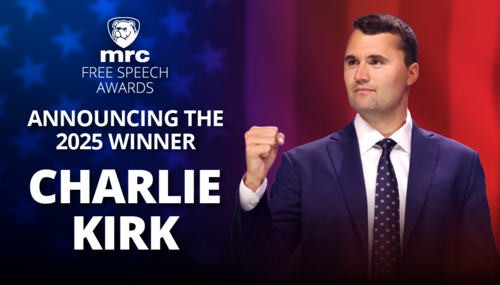Sunday's Washington Post carried not one, but two black MSNBC pundits to lament the terrible treatment of young black males after the Michael Brown shooting in Ferguson, Missouri. On the front of the Outlook section, Toure lamented "In an information war, the news media is deployed as a weapon, our collective mind becomes a battlefield, and biases are land mines waiting to explode." Some of those land mines have "Lean Forward" painted on them.
On the editorial page, Michael Eric Dyson laid into Obama as a sellout for his "monkish silence on race" and his balanced remarks on Ferguson that made him an "unreliable narrator" for the black community:

Like a Hollywood film franchise, race in the United States — especially police violence against blacks — is haunted by sequels: The locations may change, the actors are different, but the story remains the same....
[Obama] is ever mindful of not favoring black folk in his analysis lest he be seen as giving them the upper hand, something the far right never tires of charging. And yet that hardly captures the fiery realities that burn in black bodies and communities....
Obama proceeded to kick black youths while they’re down by directing his law-and-order spiel against their already over-policed and under-protected bodies: “There are young black men that commit crime” who “need to be prosecuted because every community has an interest in public safety.”
....In one rhetorical swoop, Obama leveraged the authority of the state against black youths, played to stereotypes of their criminality, maintained an emotional distance from the desperation of a group of Americans who happen to be his people and offered them moral lessons in place of public policy.
Toure's media-bias lament claimed that the black victims in these national media obsessions become "thuggified." He didn't acknowledge in any way that the liberal media take these victims and make them a national cause celebre, or acknowledge that in the Trayvon Martin case, the national media tried desperately to make the nation see him as a 12-year-old innocent:
But when there’s a black victim involved, the information takes a different and predictable turn: The victim becomes thuggified. This is an easy leap for many minds, given the widespread expectation of black criminality. If you become nervous when you see a young black male approaching on the street, it is not hard to convince you that a kid who was shot was not one of the “good ones,” that he was scary and maybe did something to deserve it. Information wars thrive on America’s empathy gap — the way some people struggle to see any kinship or shared humanity with strangers who don’t look like them.
So after 17-year-old Trayvon Martin was killed in Sanford, Fla., on Feb. 26, 2012, people were told that he had been suspended from school, that he had written graffiti, that he had smoked marijuana. As a result, many saw him as a thug — even though many non-thugs have been suspended from school or gotten high, and those are not violent acts. More important, none of that sheds any light on what happened the night George Zimmerman shot him.
In 2009, after 22-year-old Oscar Grant was fatally shot by a police officer named Johannes Mehserle while he was restrained at a BART station in Oakland, Calif., we learned that, three years earlier, Grant ran from officers after a traffic stop. Similarly, in 1991, after Rodney King was beaten by several Los Angeles police officers, we came to know that 63 days earlier, he was paroled after a robbery conviction.
Did such facts justify Grant’s death or King’s pain? Of course not. But they subtly signal that these guys aren’t good guys. It’s as if a black person must be a perfect victim to escape being thuggified, an angel with an unblemished history in order to warrant justice. The burden of the perfect victim suggests that only impeccable résumés may qualify for protection under the law and the support of the community....
Most of us have something in our pasts we would not want revealed. And for black Americans, those facts too often are used to suggest that victims of injustice don’t deserve justice, because they weren’t some sort of credit to their race. In a nation where police often approach black communities with a dragnet, stopping and frisking everyone, marking as many black men as possible with a record, it would be hard to find a black male who looks like an angel.
In the Rodney King case, Toure could not make the case that the national media didn't present him as the sympathetic victim during and after the Los Angeles riots. What he seems to be complaining about is that the criminal records and negative information ooze out at all, complicating the picture of a "perfect victim." It's a straw-man argument to claim that Americans can't process the negative information and require a "perfect victim" to support justice.
Toure's article came underneath the Post headline "When does a moment become a movement?" That ably explains what the Post and MSNBC are trying to do to exploit the Michael Brown shooting to push a leftist agenda.




